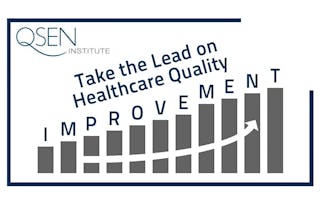Have you ever though that healthcare quality could be improved - either where you get health care treatment or where you delivery health care? Have you ever thought that there should be a way for you to determine the relative quality of your choices? Have you found yourself thinking that there should be a way for you to provide your view and input on the quality of healthcare organization? Or do you work in a healthcare organization and find yourself thinking that there must be better ways to continuously and systematically improve the quality of your healthcare organization? If you have, this course is for you.

Ends soon: Gain next-level skills with Coursera Plus for $199 (regularly $399). Save now.

Quality Improvement in Healthcare Organizations
This course is part of Healthcare Organization Operations Specialization

Instructor: Margaret Kilduff, Ph.D.
12,088 already enrolled
Included with
(200 reviews)
Skills you'll gain
Details to know

Add to your LinkedIn profile
See how employees at top companies are mastering in-demand skills

Build your subject-matter expertise
- Learn new concepts from industry experts
- Gain a foundational understanding of a subject or tool
- Develop job-relevant skills with hands-on projects
- Earn a shareable career certificate

There are 4 modules in this course
This lesson provides an overview of the course as well as an overview of quality and quality improvement in healthcare organizations.
What's included
16 readings3 assignments4 discussion prompts7 plugins
This lesson provides an overview of quality and quality improvement measures in healthcare organizations.
What's included
10 readings2 assignments2 discussion prompts6 plugins
This lesson provides an overview of data collection and analysis methodologies for quality and quality improvement measures in healthcare organizations
What's included
10 readings2 assignments2 discussion prompts6 plugins
This lesson is a synthesis of the course material to design a quality improvement program in a healthcare organization the way you would have things run in the best of all worlds.
What's included
8 readings2 assignments1 peer review4 discussion prompts5 plugins
Earn a career certificate
Add this credential to your LinkedIn profile, resume, or CV. Share it on social media and in your performance review.
Instructor

Explore more from Healthcare Management
 Status: Free Trial
Status: Free TrialUniversity of Michigan
 Status: Preview
Status: PreviewCase Western Reserve University
 Status: Free Trial
Status: Free TrialUniversity of Houston
 Status: Free Trial
Status: Free TrialImperial College London
Why people choose Coursera for their career




Learner reviews
200 reviews
- 5 stars
82.50%
- 4 stars
12.50%
- 3 stars
3%
- 2 stars
1%
- 1 star
1%
Showing 3 of 200
Reviewed on Feb 2, 2021
Very informative and above excellence learning platform!
Reviewed on Aug 12, 2020
The pdf notes are great and gives us detailed information
Reviewed on Feb 12, 2025
I have gained enough knowledge of quality standards and their application in health institutions

Open new doors with Coursera Plus
Unlimited access to 10,000+ world-class courses, hands-on projects, and job-ready certificate programs - all included in your subscription
Advance your career with an online degree
Earn a degree from world-class universities - 100% online
Join over 3,400 global companies that choose Coursera for Business
Upskill your employees to excel in the digital economy
Frequently asked questions
There are two ways to communicate directly with the instructor – one private (seen only by you and the instructor) and one public (seen by the instructor and all learners in the course). The private communication is via the comment feature within the course. The instructor sees all comments and will attempt to respond to each comment within 24 hours. The instructor also provides a direct email address with the response should future communication be needed or of interest. The public communication is via the course Feedback Discussion Forums. The instructor tries to respond to all comments in the Feedback Discussion Forums within 24 hours.
Each section of the course is marked to indicate its relevance to the work required to obtain the certificate. The markings are:
[CERT]: the section contains work which you must successfully complete to obtain the certificate.
[INFO]: the section provides information relevant to the work required for the certificate.
[PREP]: the section provides practice for the certificate work.
[FUN]:the section provides either: 1) interesting additional information which is supplemental, but not needed for the certificate; 2) an opportunity to post your comments on a specified topic for discussion with course colleagues, if you choose to do so; or 3) an opportunity to provide feedback on the course, if you choose to do so. If you are not interested in the [FUN] sections, skip them.
The short answer is that certificate learners need to successfully complete the six course sections marked [CERT]. These are:
Quiz: [CERT] Lesson One Quiz
Quiz: [CERT] Lesson Two Quiz
Quiz: [CERT] Lesson Three Quiz
Quiz: [CERT] Synthesize Course Content Self-Evaluation
Quiz: [CERT] Generate an Effective Spreadsheet Self-Evaluation
Peer Review: [CERT] Spreadsheet Submission and Evaluation
The Lesson One Quiz, Lesson Two Quiz, and Lesson Three Quiz are each open book, open note. You can take each quiz as many times as you want.
The self-evaluation “quizzes” are your own self-evaluation of the work that you have developed for the Peer Review project. The purpose of the self-evaluations is to ensure that all of the required elements of the peer review submission are completed before submission.
The Peer Review project is the capstone project for the course. The capstone project for the course requires learners to critically synthesize the material from the course and communicate/present the synthesized material to their learner colleagues. Each project is presented to learner colleagues via the peer-review feature and each learner evaluates the project of two learner colleagues.
The peer-review feature is chosen because each project is presented from the perspective of the Chief Executive Officer (CEO) of that healthcare organization. One skill required of all CEOs is the ability to communicate/present their thinking and conclusions to others and expect evaluation and feedback. Another skill required of all CEOs is the ability to critically evaluate the presentation, thinking, and conclusions of others.
More questions
Financial aid available,
¹ Some assignments in this course are AI-graded. For these assignments, your data will be used in accordance with Coursera's Privacy Notice.

